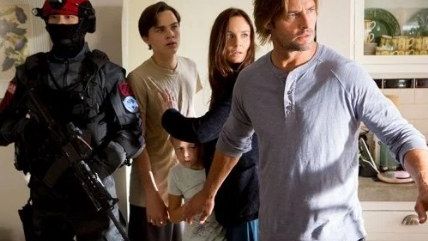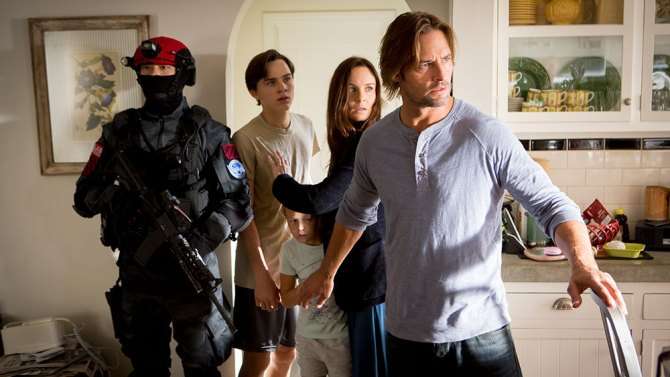Alien Invasion Series Colony Focuses on Human Intrigue
Collaborate or resist? There are no easy answers.


Colony. USA. Thursday, January 14, 10 p.m.
New car! Private tutors for the kids! More food on the table! The bounties associated with her husband's promotion seem endless, and like any blue-collar wife, Katie is thrilled: "And to think Daddy said you'd never amount to anything!" Her voice, though, is flat with irony: Husband Will's new job is selling out the human race to its new extraterrestrial masters by tracking down the leaders of a nascent resistance movement.
A TV series about an Earth squirming under the bootheels, or perhaps cloven hooves, of space aliens is nothing new; we had three different versions of the voracious lizards of V, and those buggy things in Stephen Spielberg's Falling Skies have just finished a five-season run on TNT.
But the USA cable network's Colony is a very different bucket of BEMs. It concentrates neither on the alien overlords—they don't even appear in the three episodes I watched—nor the human underground that resists them.
Instead, it's a detailed and utterly compelling examination of the motives and morality of collaboration—like a Casablanca in which the protagonist is not Humphrey Bogart's heroic Rick but Peter Lorre's oily Ugarte. If that sounds dramatically counterintuitive and even confounding, get used to it; Colony is mostly about upsetting apple carts.
Among them are the conventional set-up mechanisms of the television pilot. Colony is set in a not-terribly-distant-future Los Angeles, about a year after an extraterrestrial landing. But details about what happened, why, and even to whom, emerge only in dribs and drabs.
Los Angeles and other big cities are walled off, suggesting the aliens don't have total control of the countryside, and they mostly stay aboard their orbiting ships, relying on human quislings—proxies—as their ground-based enforcers.
The result, at least inside the walls, is a totalitarian nightmare that looks something like an East Berlin redrawn by George Lucas, a crumbling landscape of concertina wire and security checkpoints patrolled by armed anti-gravity drones.
The city is dotted with the sort of furtive marketplaces we associate with crack sales but in Colony are the site of illicit barter exchanges of everything—from oranges to tortillas to insulin—that has fallen into short supply. The most absolute prohibition of all: guns. Violators are rounded up by the Department of Homeland Security, which predictably has switched allegiance to the new bosses, and packed off to an unknown but ominously named site, The Factory, from which nobody seems to return.
This is the landscape in which garage mechanic Will Bowman (Josh Holloway, Lost) and his wife Katie (Sarah Wayne Callies, The Walking Dead) find themselves confronted by a stark choice. The government has discovered that Will's grease-monkey grunt identity conceals a past as a U.S. Army Ranger and an FBI agent. He and the family can be packed off to The Factory … or he can help the government track down Geronimo, the leader of a nascent human resistance movement. And as an additional carrot for cooperation, the Bowmans will get government help in locating their young son, who was outside Los Angeles when the wall went up.
Will's decision to accept the deal touches off an ever-widening circle of tumbling dominoes among his friends and family, creating double- and even triple-agents and spilling them into a world with no moral absolutes—or perhaps just no morals.
Even sorting out the predators from the prey become difficult. How high does the resistance's collateral body count have to reach before it becomes morally indistinguishable from the aliens? "There's nothing pretty or romantic about our conflict," one underground leader warns a new recruit who's aghast at learning that the resistance kills its own fighters rather than permitting their capture.
The question of what gives anybody the right to be the official utilitarian scorer to rule on which players get sacrificed and which get saved lurks in every frame of Colony. When Will, confronted by an old friend he's about to send to The Factory, pleads that he's only doing what he must to protect his family, he has no answer to the friend's Parthian shot: "Then everything's fine, as long as you still have your kids, right?"
The bleak existential questions posed in Colony are underlined by a grittiness that colors everything in the show, from its seedy urban cinematography to its universally excellent cast. Holloway and Callies cast off the one-note portrayals of their previous spotlight roles—Holloway's perpetually pouty bad-boy Sawyer in Lost, Callies' faithless and soon-to-be-zombie-chow wife in Walking Dead—for performances that alternate between anguished and flinty as they negotiate their rocky survivalist paths. And best of all may be Carl Weathers as Will's new partner, a cop with more affinity for doughnut shops than walking his beat. The longer he's on camera, the more complicated he seems. If you suddenly find yourself working for Hitler's Gestapo, is a hardy work ethic really a good thing?
